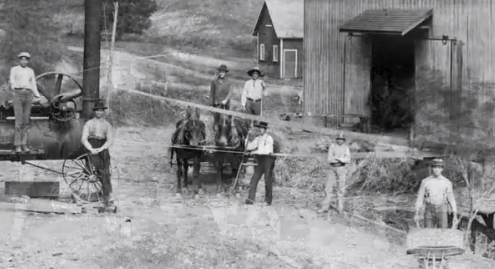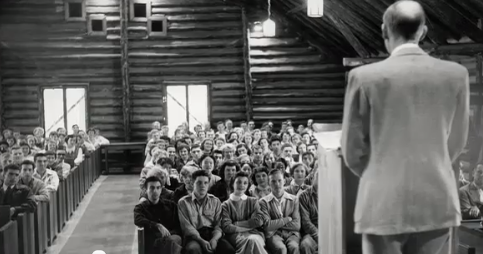The history of Warren Wilson College is told in this 30-minute documentary by award-winning producers John Disher and Steven Heller. The film explores the origins of Warren Wilson as a 19th-century mission school and details its evolution into the four-year college we know today. Narrated by Faye Grant, Bill Pullman and Stephen Collins.
Some highlights:
How the Women’s Home Missions Board of Presbyterians started the Asheville Farm School for Boys in 1894.
“If the boys didn’t work the fields, they wouldn’t eat.” The boys cooked, laundry, maintained tools and grounds.

In 1910, students dammed the Swannanoa River to generate the school’s first electricity. But then a series of blows hit: The campus’ one central building, Old Main, burned to ground Christmas week 1914. Then the river flooded: The school lost crops, livestock and its hydroelectric dam. Then came World War I .

By the mid 1920s, the outlook was grim. Into the picture stepped self-proclaimed hillbilly Henry S. Randolph, who argued school’s importance to Presbyterian officials up North. They told him if he wanted to save the school, he’d have to take on the task on himself. He became school superintendent in 1927 and went on to revitalize the school. He made two inspired hires: Arthur Bannerman and Henry Jensen. These men helped bring the school through the Depression, even when they were down to $10 cash among them.
Randolph believed that students learned best when immersed in real work tasks.
After a series of mergers, girls joined the boys on campus in 1942, and school was renamed to Warren H. Wilson Vocational Junior College and Associated Schools.
After World War II, students from other countries were admitted, ushered in by the American Field Service and Presbyterian Church overseas missions. By the time Fred Ohler joined the school in the 1950s, the place was a little United Nations.
In 1952, the school enrolled two African-Americans, two years before Brown vs. Board of Education.
Shared governance among faculty helped steer the school through contentious times.
The social revolutions of the ‘60s rippled through the school.
In 1959, service added as a requirement for graduation. The service component would, along with academics and work, form Warren Wilson’s “triad,” which has been called the spirit of Warren Wilson.
Billy Edd Wheeler arrived as a 16-year-old in 1948. He came from coal camps in West Virginia, where, he says, “the mountains are so steep they only get sunshine part of the day. … then coming into this spacious valley — I mean it was like paradise.”
The college became a four-year institution, graduating its first senior class in 1969.
Ben Holden became the school’s president in 1971, saying “This is a community in the fullest sense of the world, and let us keep it so.” Under him, the school’s emphasis was less on textbooks and more on the process of discovery.
1973: The school severed its relation with Presbyterian Church.
Environmental Studies was added as a major in 1977.
First graduate program introduced in 1981: MFA in creative writing.
John Carey replaced Holden in 1986. He addressed the need to strengthen the school’s financial situation, and made significant changes. In the process, though, he stirred up rancor, and resigned two years later.
Alf Canon succeeded him. Doug Orr became president in 1991. He established the Swannanoa Gathering and started the Environmental Leadership Center.
The school introduced its International Study Program in 1999.
Warren Wilson has been called one of the most earth-friendly colleges on the planet. The school was built in its early years on determination and innovation. It has since grown and found its identity in learning by doing, service, racial tolerance, multiculturalism and stewardship of the land.



Are they plowing rows up and down hill??!!